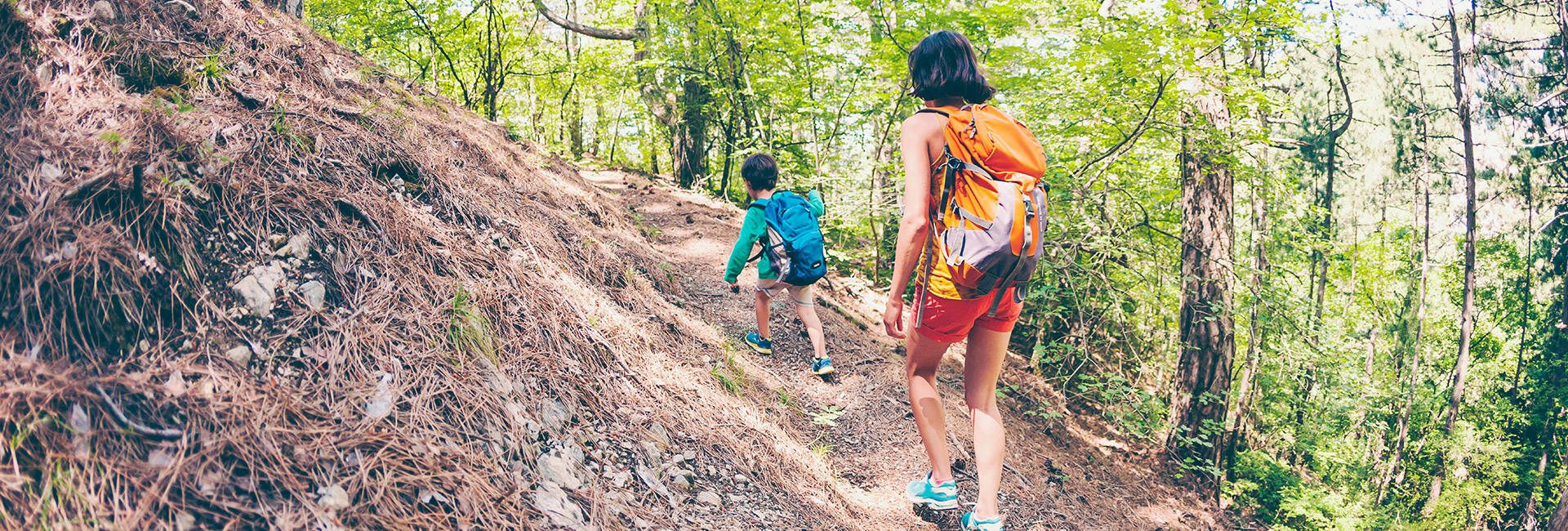Choosing where to go, packing your gear, and slipping into your hiking shoes are the first steps to an enjoyable and successful hike. Many people, however, spend little time thinking about a very important issue — the energy they will be expending. Just like a car needs fuel to drive, your body needs food and drink in order to build the energy needed to walk, especially on a long or strenuous outing. Proper selection of nutritious foods, as well as drinking plenty of water, will ensure that you have enough energy to have fun and complete your hike successfully.
At the basic level, your body requires a steady supply of carbohydrates, proteins, and fats throughout the day in order to keep you moving. A portion of this fuel will be pulled from your stored glycogen and adipose tissue, but the majority of your energy will come from what you eat each day.
Carbohydrates are the primary fuel source. Proteins are used to help repair and build muscle tissue and to assist with reducing post-exercise soreness. Fats are either used for immediate fuel or storage for later. Fuel needs should be met with high energy, nutrient-dense foods, which are foods that have high nutrient content relative to their calories.
In general, the less processed a food, the more nutrients it will provide. Try to avoid foods with preservatives, additives, processed sugar, fillers, and odd flavorings. Any foods with a high fat content will be difficult and slow to digest, and requires blood to be pulled to the stomach to aid with digestion. This can cause cramping and discomfort.
Consuming the right kinds of food 2–4 hours before you start your hike will put you on the right path to a successful adventure. Some sample pre-hike meals include:
- Oatmeal with skim milk, nuts, and dried fruit or banana
- An English muffin with nut butter and jam, fruit, and a glass of skim milk
- Breakfast burrito (eggs, salsa, cheese in a flour tortilla) with fruit juice
- Pancakes with fruit and yogurt
Short Hikes
If you plan on heading out for a short hike (1–3 hours) you won’t need to consume much on the trail. For day hikes, you will need to pack a few snacks and possibly a lunch. For your snacks, focus on choices that help to sustain a steady blood glucose level and match your caloric requirements, generally 120–300 calories for a few hours. Choose snacks with 30–60 grams of carbohydrates and whole ingredients such as oats, fruits, and nuts. Some great options include:
- Nutrition bars, such as Kind Fruit and Nut® bars, Zing® bars, Lärabars®, or Earnest Eats® bars
- String cheese
- An apple or a banana
- All-natural beef jerky
- Whole wheat fig bars
For lunch, try one of these combinations:
- A sandwich with peanut butter and banana, or turkey and avocado on whole grain bread
- A bagel with nut butter and an apple
- Whole wheat crackers with cheese, carrot sticks, and fruit

Multi-Day Hikes
On multi-day hikes, it is essential to plan your food and fluid intake to make sure you have enough to last the duration of your hike, unless you are confident about re-supply points being accessible to restock along the way.
Dried and dehydrated foods retain most of their nutritional value but are lighter in weight and smaller in volume. Canned foods are easy to prepare but are heavier and take up more space in your pack. One plan is to carry dehydrated food for breakfast and dinner and make lunches out of non-dehydrated foods. It may also be helpful to pack a multivitamin, just in case.
Separating and packaging your meals into daily rations is an easy way to plan the correct amount of food you will need for your trip. Be sure to also pack and label emergency rations just in case. You want to make sure you consume enough food to keep your core temperature regulated throughout the night and to replace the water you lost during the day.
Staying Hydrated
Although planning for nutritional requirements is extremely important, keeping hydrated on the trail is vital for a successful and enjoyable trip. Under normal conditions the human body can go days without food, but without water, problems occur rapidly.
When your brain and muscles do not have enough water, you begin to lose the ability to think clearly, your endurance and strength are reduced, and your ability to keep moving declines. You sweat during exercise in order to keep your body cool, and when you sweat, you lose water and electrolytes.
Planning for replacement of water and electrolytes is necessary to prevent moderate to severe dehydration, which can be dangerous and even lethal. When you’re experiencing serious dehydration, sweating stops and your body will overheat, resulting in fatigue, weakness, dizziness, headaches, muscle cramps, and heat stroke. You need to drink before you are thirsty and keep drinking when you no longer feel thirsty.
When your brain and muscles do not have enough water, you begin to lose the ability to think clearly, your endurance and strength are reduced, and your ability to keep moving declines.
A good habit is to start hydrating 24–48 hours prior to your hike. Normally, people lose anywhere from 0.5–1.5 liters of water per hour during a strenuous hike. Under normal conditions, you should plan for packing 3–4 liters per day with an absolute minimum of 2 liters per day, even if you expect to find places to replenish your supply.
It is a good idea to carry water purification pills or devices with you even if you are carrying sufficient fluids for the trip. In a pinch you can always boil water for at least 10 minutes to purify it. Higher daily temperatures and increased exercise intensity will increase the needed fluid intake. If you are not sure that you are taking in enough fluids, check your urine color. Light lemonade color means you are well hydrated, and apple juice color indicates that you need to drink more water.
Fuel Up For Fun
So, when digging that hiking gear out of the closet and pouring over your guide books, don’t forget that a successful hike begins with planning your fuel and fluid needs. Careful consideration of food selections along with planning and preparation of what to bring with you will not only ensure that you will not go hungry or thirsty, but it will also provide your body with the necessary fuel to keep you moving up the trail.
Start your journey to pain-free living today.
Our experts are committed to providing effective, efficient, and compassionate care to help you live a pain-free, active life. Our passion is to help every patient reach their goals on their journey to recovery and optimal performance.


